As I follow the tragic news of the Ebola crisis in West Africa, and now in the United States, I cannot help but wonder what would happen if such an outbreak occurred in Guatemala. The effects of such an epidemic would be overwhelming and calamitous, to say the least. Healthcare, such as it is, for the most part is concentrated in and around the larger cities. Eighty per cent of the country’s doctors work in Guatemala City. Only twenty per cent are available to care for the rest of the people, most of whom live in rural and remote areas. This demographic reality and uneven distribution of health professionals means that the poorer people, usually Mayans, have little or no access to basic medical care, much less any hope of surviving a life-threatening illness. Even with some access to medical care, I doubt that the outcome would be very positive. I say this, having visited a number of hospital wards and clinics and witnessed for myself the already overcrowded conditions and the mobs of people waiting to be treated. At the national hospital in Huehuetenango, for example, one must arrive no later than 6 a.m. to get a number and hope to be seen by a doctor that same day.
This is said, not to demean those who are already trying to do their best to serve the needs of the sick and dying, but to shed light on an ongoing health crisis that is having an even greater impact on people’s lives than ebola. In the United States, one person dies of this dread disease and we all panic, many of us rushing to our local hospitals and ERs with flu-like symptoms. In Guatemala thousands die every day of preventable illnesses, but few make it to a hospital to be tested and treated. A family of limited means can neither afford the cost of care nor the life-saving medicines. The only alternative is to stay home and die.
In light of these sad realities, those of us serving in the mission field understandably feel compelled to do more than preach the Gospel in a vacuum to our long-suffering Mayan brethren. Like the holy, healing unmercenaries of our Orthodox Christian faith, we must minister to the whole person, body and soul. For this reason, with the blessing of Archbishop Athenagoras of Mexico and the generous funding of the One World, One Community Foundation, the construction of a medical clinic in the village of Aguacate began on September 1st, preceded the day before by a water blessing service and laying of the cornerstone. Presiding over the ceremony were Archimandrite Mihail Castellanos, the Vicar for Guatemala, Father Evangelos Pata, the parish priest, and Father Daniel Muxtay. Once completed, hopefully in early 2015, the clinic will serve the people of Aguacate and surrounding villages. The presence of such a health care facility in this underserved region of Guatemala will not only be a blessing for the local people, but a true witness of the Gospel of Jesus Christ in action.
- Archimandrite Mihail presides over blessing service
- The clinic cornerstone bears the name of Father Andres Giron, church founder
- The Cornerstone is placed in the foundation by the priests and parish elders
- Digging the foundation and laying the footers for the clinic.
- The support walls rise with the hopes of the people.
- The exterior walls of the clinic give shape to the future clinic
- A ramp leads to the beginning of the 2nd floor work
- Wooden beams support the 2nd floor construction
- The 2nd floor or terraza of the clinic will soon have its own walls

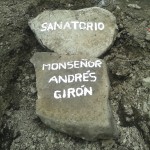
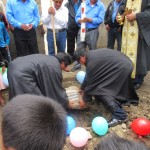
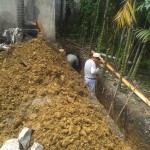
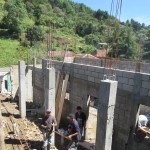
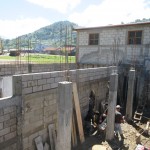
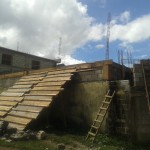
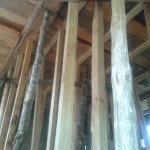
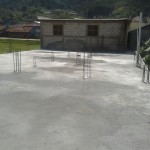
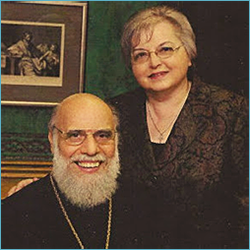

Speak Your Mind